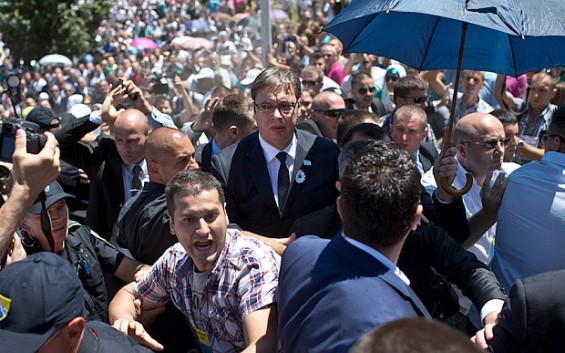 While the prime minister extends his hand of reconciliation to the Bosniaks, the media he controls refer to them as butchers, killers and extremists. The image representing Vučić to the world as a peaceful politician stands in stark contrast to the messages by which the media, using hate speech, form the domestic public opinion
While the prime minister extends his hand of reconciliation to the Bosniaks, the media he controls refer to them as butchers, killers and extremists. The image representing Vučić to the world as a peaceful politician stands in stark contrast to the messages by which the media, using hate speech, form the domestic public opinion
From the moment television audiences in Serbia saw – on regional television stations N1 and Al Jazeera, the only ones to broadcast live the entire memorial marking two decades since the genocide in Srebrenica – bottles, shoes, and rocks flying toward Prime Minister of Serbia Aleksandar Vučić, the funeral of the remains of the newly identified 136 Bosniaks was no longer the headline news, nor was the attendance of 50,000 people and 80 delegations from abroad at a commemoration paying respects in front of 6,377 graves. The Serbian prime minister became a new victim of Srebrenica, and in the days that followed, the attack against him was a dominant topic in the Serbian media.
And after Foreign Minister Ivica Dačić announced immediately in the wake of the attack that “it is clear this was attempted murder,” all the media unreservedly adopted such a charge. The nation, however, breathed a sigh of relief when Vučić arrived in Belgrade and said after a government meeting, during a TV broadcast, that even after the lynching and the attempted murder, his hand of reconciliation remained outstretched to the Bosniaks.
“This attack was well organized and prepared, and I’m happy that it was not organized by the families of the victims and those who lost someone… Except for my glasses, I’m fine,” the prime minister said, referring to his attackers as “the fools that can be found in any nation.”
However, what followed in the coming days, in the highest circulation print media that we read for the sake of writing this article, had the exact opposite intonation from this peacemaking message. It was precisely the media close to the prime minister and controlled by authorities that used hate speech to overshadow all statements made by politicians before and after the attack in Potočari.
“Orić sent butcher to kill Vučić”
The journalistic investigation that followed immediately after the attack on the prime minister, mostly by “anonymous but reliable sources,” was turning up, day after day, new assassins that had targeted Vučić.
The tabloid Alo claimed the assassination was “orchestrated directly from Sarajevo via the notorious Black Swans group that has connections with butcher Naser Orić.” The attack, this paper wrote, was led by members of “a notorious group of fans of football club Željezničar from Sarajevo, ‘Manijaci’, but also by supporters of the extreme ‘Torcida Sandžak’ group from Novi Pazar.”
Media’s inflammatory reporting was only a continuation of the rhetoric that had developed several weeks earlier. The arrest of Naser Orić and Sarajevo’s insistence that he be extradited to Bosnia rather than Serbia, led the prime minister to read out loud, in front of reporters, that Orić used his knife to gouge out the eyes and cut the throat of Judge Slobodan Ilić in Srebrenica, but that despite this he was ready go to Potočari if the Bosniaks wanted that
Kurir published a fairly low resolution photograph on its front page that showed a man with a raised arm in the crowd near the prime minister, while the headline suggested: “Going at the Serbian prime minister with a knife – Orić sent a butcher to kill Vučić?”
The knife makes no further appearance as the weapon used in the attack, but a series of new suspects lined up. Večernje Novosti (on July 14) revealed this was the son of Naser Orić, and it was the only paper where one could learn, naturally, from anonymous sources, that tents had been set up not far from Potočari a day before the commemoration where former members of the Army of Bosnia-Herzegovina prepared the assassination. “Some of them carried Turkish flags and wore Wahhabi hats,” writes Novosti.
While security experts were explaining in all the newspapers that Vučić had been “driven into a hornet’s nest” at the cemetery in Potočari (Alo, July 13), and that the Republic of Srpska police had not been allowed to enter the fenced area that was secured by only 150 people from the Securitas Federacija BiH agency, Naše Novine (on July 14) published on the front page that “ISIS is behind the attack on Vučić?” and claimed those responsible for “the attempted lynching of the prime minister, according to the findings of the Bosnian Prosecution, are Bakir Izetbegović’s adviser Mirsad Ćatić, as well as the associate of the Bosniak member of the Presidency of Bosnia-Herzegovina Almir Merdić, who is close to the SDA and whose brother-in-law was arrested in America as a helper of the terrorist Islamic State.”
A day later (July 15) Blic, giving different names, stressed on the front page: “The Black Quartet from Srebrenica – Bakir’s four went after Vučić.” An info box in the article, however, informed us also that a Bosnian website had an ad offering the rock that hit Vučić in the head for KM 1,500.
All the claims made by “media prosecutors” pointed to Bosnian Presidency member Bakir Izetbegović. Those were also supported by the prime minister with his statement that “Izetbegović pretended not to see me in Potočari!” and, “Bakir is morally guilty of the attack.”
Messages were coming from the Council of Ministers of Bosnia-Herzegovina that the investigation would be completed as soon as possible, but Informer did not believe them. “They need a week just to go through video footage?!,” the paper called them out in a much sterner tone than Interior Minister Nebojša Stefanović did when he doubted there was “sincere readiness in Bosnia-Herzegovina to make the investigation quick and efficient.” Politika, however, concludes: “Sarajevo is indifferent to the attempt to murder Vučić.”
“They cut off Serb heads and now they blame us for the lynch of Vučić”
And while apologies and condemnation of the attack on Aleksandar Vučić coming from Bosnia was carried on the margins of top articles, Sandra Mališić, deputy editor of the politics desk at Kurir, concluded, in a commentary entitled “Bakir’s dirty games”: “He showed that the apple does not fall far from the tree and that he is no better than his father. He never renounced the extremists.”
The same paper reminded us of a gruesome photograph that was seen in the press during the wartime 1990s. A soldier holding a severed head illustrated the text under the headline, “They cut off Serb heads and now they blame us for the lynch of Vučić.”
The reporting of the daily Danas was the least impassioned. Safeta Biševac reminds that “Vučić noted he never witnessed such hatred as that shown by the ‘fools’ who attacked him in Potočari. As if he never attended SRS gatherings, and as if he is unaware of extremist occurrences in Serbia“
Most comments posted on websites under this and similar kind of articles are not fit to quote, but they are a good indicator of the out of control or – on the contrary – really well controlled and directed outpouring of hatred and violence that the media’s web-administrators published.
The reporting of the daily Danas was the least impassioned. During the first couple of days after the attack, this was the only newspaper that carried polemical commentary regarding some of Premier Vučić’s statements. Safeta Bisevac reminds that “Vučić noted he never witnessed such hatred as that shown by the ‘fools’ who attacked him in Potočari. As if he never attended SRS gatherings, and as if he is unaware of extremist occurrences in Serbia.”
Informer, on the other hand, published exclusively “Three codewords for the murder of Vučić – Vučić fagot – Kill Chetnik – Allahu Akbar.” Beside the unnamed diplomatic sources with knowledge of the investigation that explained the tactic of the attack, according to whom these shouts served to let the attackers know where in the crowd Vučić was at any time, Marko Nicović, a former chief of the Belgrade police, was also quoted: “Attack codes show that the logistics was organized perfectly.” In his statement for Informer former SAJ Commander Goran Radosavljević Guri was also convinced that “the police of Bosnia-Herzegovina was definitely involved” in the attempted murder.
But that was not the end of the exclusives carried by this daily. A day later – “A sniper and bullets were ready for Vučić,” in an article signed with initials B.R., Informer claims what authorities in Sarajevo “are trying to hide” – that OSA intelligence officers had found a sniper hidden in the bushes close to a local road near Potočari. This was revealed to them by an anonymous source who said: “They are hiding some terrible secret!, and will never at any cost admit that this sniper had been found… did somebody want to liquidate him like Đinđić 12 years ago?” the unknown interlocutor wondered, and said it would be best to ask the British how a sniper rifle found its way to the vicinity of Potočari.
That was not all, either. On Thursday, July 16, Informer reports there is “great panic among Bosnian intelligence officers.” An unnamed source close to international security circles confided in this paper to say that Bosniak intelligence officers were now “pushing a story that you yourselves brought the sniper to Potočari and hid it there.”
“The Rock in the Hands of the English”
This kind of inflammatory reporting by the media was only a continuation of the rhetoric that had developed several weeks earlier. The arrest of Naser Orić and Sarajevo’s insistence that he be extradited to Bosnia rather than Serbia, led the prime minister to read out loud, in front of reporters, that Orić used his knife to gouge out the eyes and cut the throat of Judge Slobodan Ilić in Srebrenica, but that despite this he was ready go to Potočari if Bosniaks wanted that.
Srebrenica Mayor Ćamil Duraković understood this statement as a provocation. “It would have been better for the Serbian prime minister to say he did not want to come because it is Serbia’s choice to not yet accept the facts from the past and the court ruling that genocide happened in Srebrenica,” was his message to Vučić.
Naše Novine point out to the unexpected Serbian trump card in the fight against a British draft resolution on Srebrenica – the victory of Novak Đoković at Wimbledon! A day after his victory, the front page read, “Nole exacts revenge on the English for the genocidal resolution.“
At the same time the public in Serbia was in a state of heightened tension, on a daily basis keeping an eye on whether the UN Security Council would adopt a British resolution that mentions genocide. Serbian President Tomislav Nikolić sent letters to both Putin and the English queen, while PM Vučić’s message was that whether he would show up at the commemoration for the Srebrenica victims depended on the resolution.
In the end, Russia vetoed, the resolution was not adopted in the SC, while one with identical qualifications passed in the European Parliament with much less noise. Finally, on July 10 before midnight, the prime minister announced his decision to go to Srebrenica during a news conference that was broadcast live by all major television stations.
All this took a new twist after the attack in Potočari: Serbia had a Srebrenica victim of its own – the prime minister, while the highest circulation media struck back at the British Empire and suspect it of being an accomplice.
As soon as on July 13 Informer explains that “The goal of the assassination of the Serbian PM was – kill Vučić and cause war,” while “the directive from London” was “to either run Vučić over or cause his bodyguards to shoot at the victims’ families.”
The same day, Milan Lađevic, Kurir’s editor-in-chief, writes the commentary “The rock in the hands of the English” and notes that “Serbs died at the hands of both the Germans and the allies. However, is this now a new strike of the English in order to weaken the influence of Germany in the Balkans, or is something else the case? Are they ready to go so far as to cause war in these regions?”
Večernje Novosti joined this seemingly synchronized campaign, claiming that “according to some unofficial information, the attack on the Serbian delegation was approved by the British secret service.”
“As of August of last year they have had some 300 intelligence officers in Bosnia-Herzegovina. The goal of the operation was, allegedly, to destabilize Bosnia and Serbia,” Novosti published.
“It is absolutely not the practice of British and U.S. services for the lynching of Vučić in Srebrenica to have been prepared without their handiwork, empires cannot stand defeats,” Naše Novine editor Đoko Kesić writes in his commentary. According to him, the defeat in question was the failure of the British resolution in the UN Security Council.
Naše Novine, however, point out to the unexpected Serbian trump card – the victory of Novak Đoković at Wimbledon! A day after his victory, the front page read, “Nole exacts revenge on the English for the genocidal resolution.“
“Vučić faced himself in Srebrenica“
PM Aleksandar Vučić’s doubtless courage to, despite the tense relations in the region, and even the burdens of his own biography dating back to the 1990s, go among the mothers of Srebrenica, was not covered by the daily press in that manner. Only on Thursday when Nedeljnik and Vreme came out readers were reminded that Boris Tadić attended commemorations in Potočari twice while he served as president.
“I’ve been insulted more in Serbia than in Srebrenica,” Tadić reminisced in an interview for Nedeljnik. Writing for Vreme, the initiator of the banned campaign 7000 Dušan Mašić points out the difference was that Vučić “went there to face himself. It was certainly not easy for him to go there. What he saw there was the consequence of what he once stood for.”
The media reporting about Srebrenica took a new twist after the attack in Potočari: Serbia had a Srebrenica victim of its own – the prime minister, while the highest circulation media struck back at the British Empire and suspect it of being an accomplice
Facing genocide is not difficult only for Vučić, but also for the Serbian public and media. Only Vreme thought of reaching out to war crimes prosecutors in Belgrade and Sarajevo, Vladimir Vukčević and Ibro Bulić, to discuss this topic. Without any dilemma they agreed that genocide had been committed in Srebrenica.
Other media found some other interlocutors more attractive. A certain Sheik Imran Hosein, introduced as one of the most renowned Muslim theologians and philosophers, said in his message to the Bosniaks carried by almost all the newspapers: “There is certainly no proof that this was part of a systematic plan as was done by Adolf Hitler with the Jews, whom he feared would endanger his rule” and suggested, “I invited both the government in Serbia and the government of Bosnian Serbs to organize a referendum among Serbs and hear what people have to say about it.” Simon Wiesenthal Center Director Efraim Zuroff’s claim that unlike the Holocaust, there was no genocide in Srebrenica, was also widely quoted.
Nevertheless, it is hard to find journalistic justification for a letter published in the politics sections of Blic and Kurir, that one Jelena Radojković, the Oxford Center director, had sent to the British Ambassador in Belgrade Dennis Keefe. She does not accept, “neither linguistically nor factually” that genocide had taken place in Srebrenica.
“The number of victims determined in 2005 was 1,180. In a mysterious way that number in 2014 reached 6,400 victims, while this year, with the appearance of ‘some new victims’ the number is 8,000. We wonder how many victims there will be in, say, 2020,” the Oxford Center director writes. She then makes her point: “The DNA analysis is proved to be unreliable, and was very likely also falsified, because Bosnian Muslims are of completely the same ethnic and genetic origin as Serbs, which has been historically proven.”
20 years after the genocide in Srebrenica and after the wars in the former Yugoslavia, the rhetoric in most Serbian media follows the well-known, well-developed, warmongering matrix. Prime Minister Vučić, with his “outstretched hand” even after the attack in Potočari convinced the world that he has changed, that he is different. “Bakir Izetbegović arriving at Vučić’s feet,” Kurir writes on July 16, and this news story, published by all the media, announces yet another victory of the Serbian prime minister in his race for the position of the new “factor of stability” in the Balkans.
All he has to do is convince the suspicious part of the Serbian public that the media he controls, which very much form the public opinion of Serbia, are not his ventriloquists.








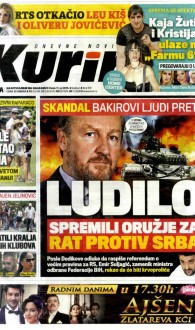
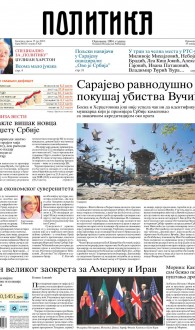
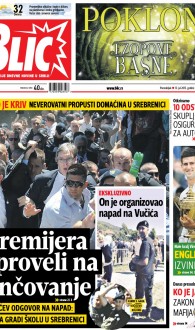
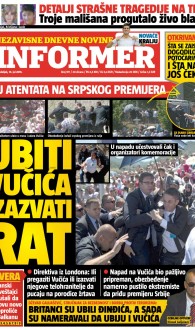
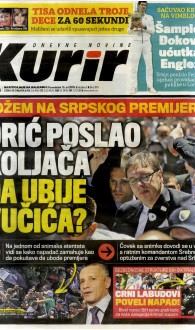
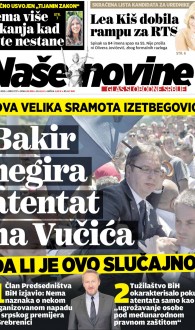

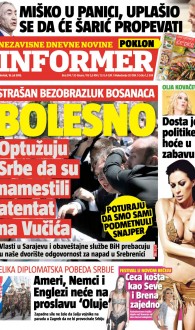
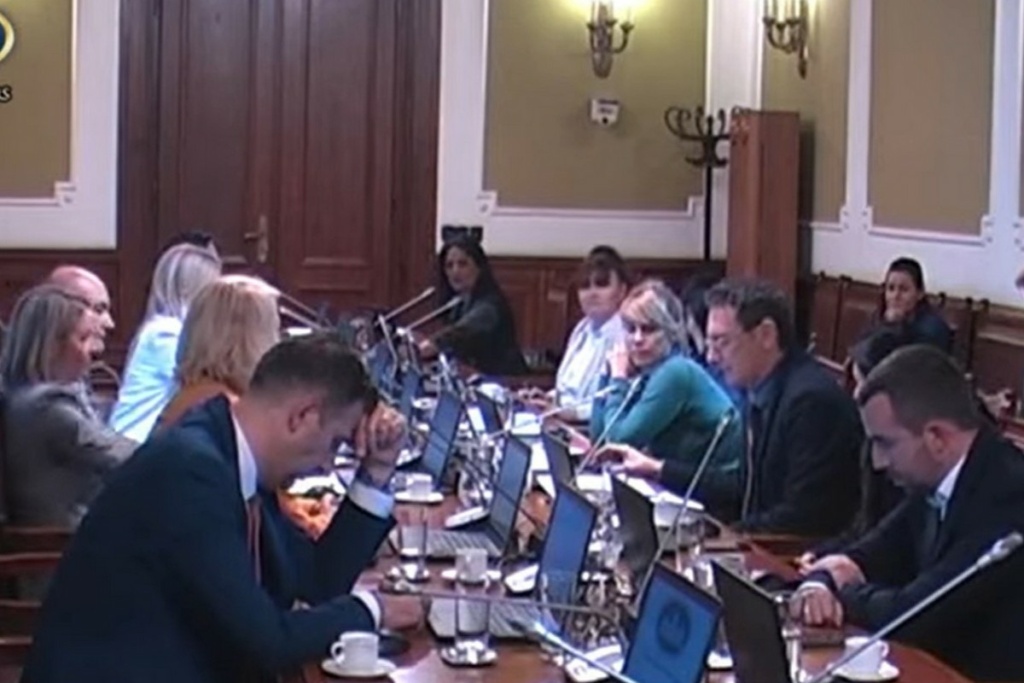 Medijski amandmani umiru u skupštinskom mraku: Noćno zasedanje Odbora, u četiri čina
Medijski amandmani umiru u skupštinskom mraku: Noćno zasedanje Odbora, u četiri čina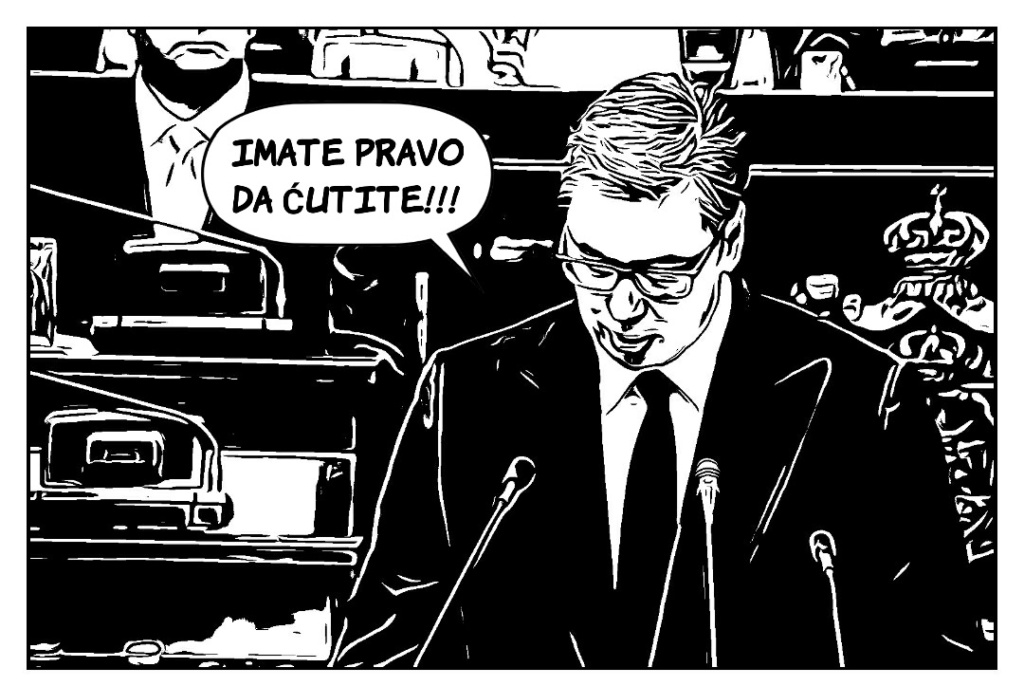 Snaga dobre priče: O mitologiji medija
Snaga dobre priče: O mitologiji medija Kako ojačati lokalne medije i obnoviti informisanje o radu opštinskih vlasti: Britansko rešenje daje rezultate
Kako ojačati lokalne medije i obnoviti informisanje o radu opštinskih vlasti: Britansko rešenje daje rezultate
Unfortunately, by using the word „genocide“ in your article you have automatically chosen a side and thus the objectivity of your journalism is highly questionable. Despite the fact that the above mentioned term has been pushed, pulled and mashed in all the main stream media for the last decade or so it is completely divorced from reality. There have been at least 20 instances of genocidal cleansing in the world, either by the Germany in todays Namibia, by the Turks in Mesopotamia during WW I, by the african communists in Ethiopia and so on which were udoubtedly tens or hundred times worse and yet you and your colleagues fall to such rethoric as to dare and label the Srebrenica massacre as the worse in modern history. Oh, and yes, it was beyond any doubt a massacre, but not a genocide! The whole dismemberment of yugoslavia was a massacre, on all sides, still unfinished, left to smolder by the ones who initiated it, just in case they need to reignite… this time probably with the help of all the ISIS commanders buying up property in Bosnia and turning them into training camps, all with the all-seeing american eye looking but pretending not to see!